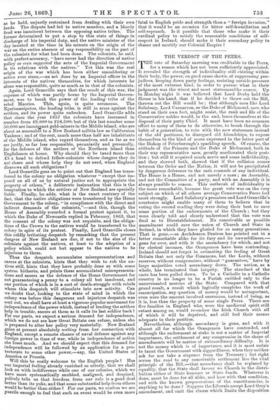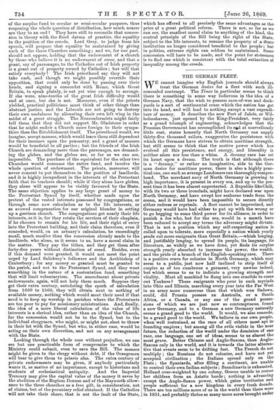THE VERDICT OF THE PEERS.
THE vote of Saturday morning was creditable to the Peers, for a reason which has not been sufficiently appreciated. It revealed the strength of individuality still existing within
their body, the power, on good cause shown, of suppressing prejudices, keeping down party feelings, resisting outside pressure of the most extreme kind, in order to pursue what in their judgment was the wisest and most statesmanlike course. Up to Monday night it was believed that Lord Derby held the House in his hand, that if he decided to throw out the Bill, thrown out the Bill would be ; that although men like Lord Salisbury, Lord Carnarvon, or the Duke of Richmond, men who stand on their own feet, might resist, the rank and file of the Conservative nobles would, in the end, leave themselves at the disposal of their party Chief. It must have been no common effort to many of them to do otherwise, to break through the habit of a generation, to vote with the new statesmen instead of the old partizans, to disregard old friendships, to expose themselves to the kind of scorn expressed in the latter part of the Bishop of Peterborough's sparkling speech. Of course, the attitude of the Primate and the Duke of Richmond, both in their way representative men, greatly ameliorated their position; but still it required much nerve and some individuality, and they showed both, showed that if the collision comes between the Order and the Nation, it will not be precipitated by dangerous deference to the rash counsels of any individual.
The House is a House, and not merely a man ; an Assembly, and not the Committee of a party, and with an Assembly it is always possible to reason. This outbreak of individuality is the more remarkable, because the great vote was on the very subject on which of all others average Conservative Peers feel most strongly. Lord Salisbury's promises and Lord Granville's courtesies might enable many of them to believe that in voting the second reading they were doing their best to save some portion of the endowments of the Church ; but they were clearly told and clearly understood that the vote was final as to Disestablishment. No conceivable or possible amendment could save the union of Church and State in Ireland, in which they have gloried for so many generations. That is gone,—as Archdeacon Denison has pointed out in a letter remarkable alike for its fury and its unworldliness,—
gone for ever, and with it the ascendancy for which, and not for clerical incomes, the Orangemen have been contending.
Ireland should not forget in estimating the feeling of Great Britain that not only the Commons, but the Lords, without reserves, without compromises, without "guarantees," have by large majorities voted ascendancy down. The nation, as a whole, has terminated that iniquity. The standard of the caste has been pulled down. To be a Catholic in a Catholic country is no longer to be a Pariah entitled only to the uncovenanted mercies of the State. Compared with that grand result, a result which logically completes the work of emancipation, any question of money would be unimportant, even were the amount involved enormous, instead of being, as it is, less than the property of some single Peers. There are five families in England who, were the media3val spirit still extant among us, would re-endow the Irish Church with all of which it will be deprived, and still feel their means adequate to their position. Nevertheless, although ascendancy is gone, and with it almost all for which the Orangemen have contended, and although the endowment at stake is not a matter of Imperial importance, the settlement of any compromise in the shape of amendments will be matter of extraordinary difficulty. It is not the money which is of importance, and it is most unfair to taunt the Government with niggardliness, when they neither ask for nor take a sixpence from the Treasury ; but right across the road to any conceivable settlement lies the vital principle of the Bill,—that ascendancy shall be replaced by equality, that the State shall favour no Church in the distribution either of State honours or State funds. Whatever is done, must be done for all alike, and how with that condition, and with the known prepossessions of the constituencies, is anything to be done ? Suppose the Liberals accept Lord Grey's amendment, and omit the clause which limits the disposition of the surplus fund to secular or semi-secular purposes, thus reopening the whole question of distribution, how much nearer are they to an end ? They have still to reconcile that concession in theory with the fixed datum of practice, the equality in the position of the creeds. Lord Grey, to judge from his speech, will propose that equality be maintained by giving each of the three Churches something ; and we, for our part, should not oppose, holding that the endowment of a church by those who believe it is no endowment of error, and that a grant, say of parsonages, to the Catholics out of Irish property is a grant out of property owned by Catholics ; but will that satisfy everybody ? The Irish priesthood say they will not take cash, and though we might possibly override their opposition, that could only be done by passing over their heads, and signing a concordat with Rome, which Great Britain, to speak plainly, is not yet wise enough to arrange. If she were, nine-tenths of the great Irish difficulty would end at once, but she is not. Moreover, even if the priests yielded, practical politicians must think of other things than abstract justice, and the Liberals are not going to destroy their own usefulness by alienating their own left wing in the midst of a great struggle. The Nonconformists might fairly tell them that they did not support Mr. Gladstone in order that he might endow a Church more foreign to their sympathies than the Establishment itself. The priesthood would, we imagine, accept manses, which would leave them still dependent for their incomes upon the peasantry, and a grant of manses would be beneficial to all parties ; but the friends of the Irish Church are demanding more than the parsonages, are demanding the glebes, and the glebes are, so far as we can see, impossible. The purchase of the equivalent for the other two Churches would consume the entire fund, and involve the whole question of endowment. The priests, moreover, will never consent to put themselves in the position of landlords, and it is highly inexpedient in the interests of the Protestant faith that its teachers should; while if they alone have glebes, they alone will appear to be visibly favoured by the State. The same objection applies to any large grant of money to the Protestant Synod by itself, whether made upon the pretext of the vested interests possessed by congregations, or through some new calculation as to the life interests, or as avowed compensation for our original blunder in setting up a garrison church. The congregations get nearly their life interests, as it is, for they retain the services of their chaplain, if he chooses to remain for his life, and their right of entry into the Protestant building, and their claim therefore, even if conceded, would, on an actuary's calculation, be exceedingly small, much smaller than the concession already made to the landlords, who alone, as it seems to us, have a moral claim in the matter. They pay the tithes, and they get them after forty-five years without distinction of creed. Besides, even if this demand were granted, it would not meet the point urged by Lord Salisbury's followers and the Archbishop of Canterbury ; for any money so granted must be granted to the parish, and not to the Protestant Synod, and they want something in the nature of a sustentation fund, something that will limit voluntaryism. The amendment about private endowments, again, will not help them much. Suppose they get their extra century, antedating the epoch of calculation from 1660 to 1560, they will obtain next to nothing of available money, nothing which would meet their need if that need is to keep up worship in parishes where the Protestants are too poor to pay for missionary ministrations. And, finally, the idea of a more liberal calculation of the value of life interests is a clerical idea, rather than an idea of the Church, for the concession would not be to the Synod, but to the individual clergymen, who might, or might not, elect to throw in their lot with the Synod, but who, in either case, would be acting on their own discretion, and not on any arrangement with the State.
Looking through the whole ease without prejudice, we can see but one practicable form of compromise to which the Ministry could submit, even to save the Bill. The manses might be given to the clergy without debt, if the Orangemen will bear to give them to priests also. The extra century of private endowments may be given, if anybody particularly wants it, as matter of no importance, except to historians and students of ecclesiastical antiquity. And the Imperial Treasury may give the capital value of the money it saves by the abolition of the Regium Donnm and of the Maynooth allowance to the three churches as a free gift, in consideration, not of claims, but of the pecuniary relief obtained. If the Catholics will not take their share, that is not the fault of the State,
which has offered to all precisely the same advantages as the price 9f a great political reform. There is not, so far as we can see, the smallest moral claim to anything of the kind, the central principle of the Bill being the right of the State, subject to the life interests, to resume the property of a State institution no longer considered beneficial to the people ; but in politics, extreme rights can seldom be maintained. Some concession will have to be made, and the point for statesmen is to find one which is consistent with the total extinction of inequality among the creeds.































 Previous page
Previous page